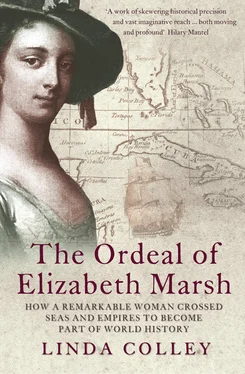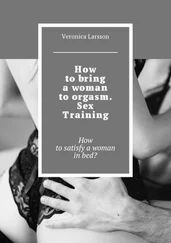He seems perplexed, but continues to importune her. On her knees, she replies:
‘I implore your compassion, and – as a proof of the esteem you have given me reason to expect – I beseech you to permit me to leave you forever.’
He covers his face with his hands and waves her away. The slave interpreter grabs her by the hand, and:
Having hurried, as far as possible to the gates, found it no easy matter to pass a great crowd which had assembled there. My worthy friend [James Crisp] was on the other side, with his hair all loose, and a distracted countenance, demanding me as his wife; but the inhuman guards beat him down for striving to get in, and the black women, holding me and hallooing out – No Christian, but a Moor – tore all the plaits out of my clothes, and my hair hung down about my ears. After a number of arguments, my friend prevailed; and, having forced me from the women, took me in his arms, and, with all possible expedition, got out of their sight. 64
Rewritten and converted into dialogue, Elizabeth Marsh’s retrospective published account of the climax of this, her last interview with Sidi Muhammad, reads like an extract from a contemporary play or novel. This is scarcely surprising since she certainly drew some inspiration from the latter form of literature, and possibly also from the former. Nor is the drama, even melodrama, of this part of her story at all surprising. She wrote it in 1769, in the midst of another and different phase of her ordeal, when she was under acute pressure. Yet for all the naïve literary artifice, and a clear element of invention (it was Western European states, for instance, not Maghrebi societies, that traditionally burnt religious apostates), authentic bewilderment and terror still seep through her words. This was not surprising either. Her danger in Morocco had been real, and her temptations had been real.
Because women rarely worked as sailors or traders, and travelled far less frequently than men, they formed over the centuries only a minority of the Europeans who were captured at sea by Muslim corsairs. But European women who were captured in this fashion were far more likely than their male counterparts to be retained for life for sexual or other services in Maghrebi and Ottoman households. This was particularly the case if they were young, single, poor, or in some other way unprotected. In the 1720s, Moroccan corsairs are known to have taken at least three British women at sea. Two of these were the wives of prosperous Jewish merchants who were captured alongside them, and in due course all of these individuals were ransomed and handed over to the Royal Navy. The remaining woman, Margaret Shea, was young and single when she was captured travelling on her own from Ireland in 1720, and she was treated very differently. Impregnated after being brought to Morocco, passed between several owners, and converting or forced to convert to Islam, she seems never to have got home. 65 Such incidents also occurred in the second half of the eighteenth century. After his formal accession to the Sultanate in November 1757, Sidi Muhammad committed himself to reducing corsairing and slave-taking as part of his wider policy of improving commercial relations with the West. Nonetheless, he is known to have retained attractive and vulnerable Christian female captives. In about 1764, a very young Genoese woman was shipwrecked on Morocco’s Mediterranean coastline. Like Elizabeth Marsh, she was brought to Sidi Muhammad’s palace at Marrakech, but unlike Marsh she converted to Islam, submitted to entering the harem first as a concubine, then as one of his wives, learnt to read and write Arabic, and was renamed Lalla Dawia. 66
As a Genoan, this woman hailed from a modest republic possessed of only a small navy and limited diplomatic leverage. Yet although Elizabeth Marsh and her fellow hostages came by contrast from the world’s foremost Protestant power, this did not automatically guarantee their safety or her own virtue. When Lalla Dawia told her story in the 1780s to an English doctor, William Lempriere, who had been allowed into the Sultan’s harem in order to treat her, she made no mention of actual acts of coercion, as distinct from threats, being used against her when she first arrived at Sidi Muhammad’s palace in 1764. With no immediate prospects of escape or rescue, and cut off from her family, her resistance had simply been worn down over time in the face of the Sultan’s blandishments. This could easily have been Elizabeth’s fate too. In 1756 Britain was engaged in a transcontinental war, and needed Moroccan supplies for its only remaining Mediterranean base, Gibraltar. Its politicians were in no position to dispatch an expeditionary force against Sidi Muhammad to rescue a handful of low-grade hostages, and in any case, acting in that fashion was never at any time standard British policy. Britons who were captured at sea and brought to Morocco in this period customarily spent at least a year, and usually more, in confinement or engaged in hard labour there, until the Sultan of the day allowed negotiations to get under way for their release. So the Ann’s
Конец ознакомительного фрагмента.
Текст предоставлен ООО «ЛитРес».
Прочитайте эту книгу целиком, купив полную легальную версию на ЛитРес.
Безопасно оплатить книгу можно банковской картой Visa, MasterCard, Maestro, со счета мобильного телефона, с платежного терминала, в салоне МТС или Связной, через PayPal, WebMoney, Яндекс.Деньги, QIWI Кошелек, бонусными картами или другим удобным Вам способом.












